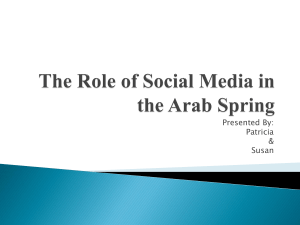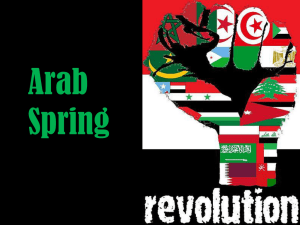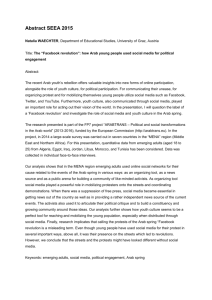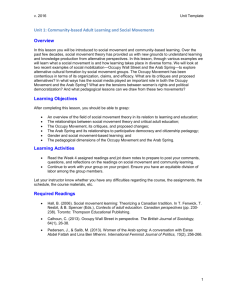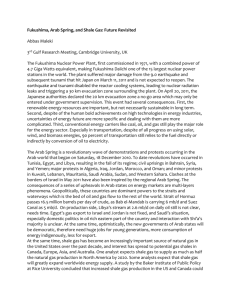Conference schedule - Victoria University of Wellington
advertisement
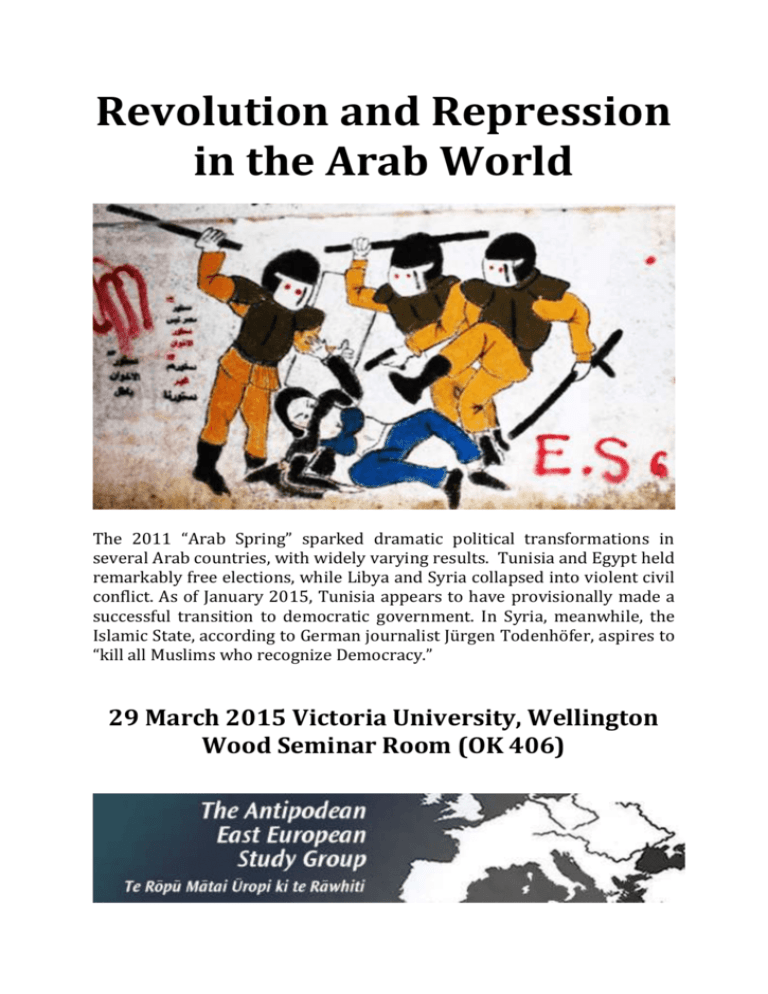
Revolution and Repression in the Arab World The 2011 “Arab Spring” sparked dramatic political transformations in several Arab countries, with widely varying results. Tunisia and Egypt held remarkably free elections, while Libya and Syria collapsed into violent civil conflict. As of January 2015, Tunisia appears to have provisionally made a successful transition to democratic government. In Syria, meanwhile, the Islamic State, according to German journalist Jürgen Todenhöfer, aspires to “kill all Muslims who recognize Democracy.” 29 March 2015 Victoria University, Wellington Wood Seminar Room (OK 406) Maps Conference location: Old Kirk entrance near the Hub (via “google maps”) Location of the Marrakech Café (via “google maps”) Conference Schedule 10:00 Welcoming Remarks 10:15 Alexander Maxwell “A Case for Optimism about Arab Democracy” 11:00 Estelle Townshend “Unravelling Syria’s Ethno-Sectarian Politics” 11:45 Michael Biggs “Repression and Anti-Coup Mobilization in Egypt” 12:30 Lunch break 1:30 Adel Abdel Ghafar “Social Media and Egyptian Activism” 2:15 Joe Burton “The Internet as a Tool of Suppression and Liberation” 5:30 Dinner at the “Marrakech Café” 305 Evans Bay Parade Open for dinner from 5:00 pm Conference Abstracts “When Regimes Attack: Repression and Anti-Coup Mobilization in Egypt” Michael Biggs (Sociology) St Cross College, University of Oxford, UK Abstract: When do governments repress protest? Informant testimony and an original event catalogue of over two thousand protests following the 3 July 2013 military coup in Egypt suggests that the regime was more likely to repress larger protests and protests that occurred in ‘sensitive spaces.’ Protests that occurred during Ramadan, or those organized by women, were significantly less likely to be targeted. As protestors learnt the limits of the regime’s coercive capacity, they changed the timings of their protests and adopted new, transient tactics that allowed them to mobilize at the interstices of regime power. “The Internet as a Tool of Suppression and Liberation during the Arab Spring. Joe Burton (Political Science) Victoria University, Wellington, New Zealand Abstract: The Arab Spring has been one of the most remarkable political events in the post-Cold War era, resulting in a wave of new governments, significant opportunities for democratic reform and transition, but also dangerous instability. This paper seeks to shed light on the role of the internet and communications technology in these events and asks a simple but important question: does the Arab Spring demonstrate that the internet has become an influential component in intra-state conflict, and, if so, in what ways? The paper argues that the internet, including but not limited to social media, has been used as both a tool of liberation and suppression during the Arab Spring and that control of cyberspace has been increasingly important for governments, opposition groups and outside actors as events have unfolded. “Social Media & Egyptian Activism after the January 25th Uprising: A Social Movement Theory Approach” Adel Abdel Ghafar (Arab and Islamic Studies) Australian National University, Canberra, Australia Abstract: There has been a growing body of research on the impact of social media on the 2011 Egyptian uprising, however much less attention has been given to grassroots activism since then. This presentation uses a social movement theory approach to investigate two case studies of causes that have utilized social media to advance their aims, the ‘No To Military Trials’ campaign and the ‘End Sexual Harassment’ campaign. The presentation seeks to highlight the continued convergence between citizen media and activism in post 2011 Egypt. “Demotic Legitimacy and Modernization: A Case for Optimism about Arab Democracy” Alexander Maxwell (History) Victoria University of Wellington, New Zealand Abstract: An overview of world history suggests that even if the short-term prospects for democratic government in North Africa seem bleak, the long-term prospects for democracy in the Islamic world remain favourable. One might distinguish “democracy” from “demotic” political legitimacy: “demotic” rhetoric and institutions employ the symbolism of popular sovereignty, with or without actual democratic content. The spread of demotic symbolism foreshadows the emergence of more genuine democracy, but only with a long gap. Demotic revolutions only lead to stable democracy after a period of struggle which normally takes at least a century. Current events, however alarming, suggest that demotic ideals are spreading rapidly, suggesting that democratic governments should follow sooner or later. “Unravelling Syria’s Ethno-Sectarian Politics” Estelle Townshend (International Relations) Waikato University Abstract: This presentation aims to describe the sectarian dynamics within the Syrian civil war and within the Assad regime. It begins with an analysis of the rise to power of the Assads and the projection of the persecuted Allawite sect – in particular their elites – from the lowest rung of Syrian society to the highest. The Allawite President Hafez al Assad secured stability by a repression so harsh and effective that it masked but did not eradicate the deep tensions and communal divisions within Syrian society which were to make themselves felt during the reign of his successor, Bashar al Assad. However the fledgling uprising initiated in 2011 was sparked as a chain reaction within the Arab Spring phenomenon sweeping the region, and was triggered primarily by shared aims such as a desire for greater freedom, human rights and democracy. How did this degenerate into a seemingly existential sectarian battle? Were the Syrian protests part of the protests for freedom or are they part of a darker plot to exchange Allawite dominance for Sunni? Was the Assad regime right all along? Were they indeed the bulwark against Sunni Islamist extremism they claimed to be? Or is there more to this picture then they claim? The dissection of the sectarian dynamics within the Syrian civil war can answer these questions. Participant Contact Information Michael Biggs Joe Burton Adel Abdel Ghafar Alexander Maxwell Estelle Townshend michael.biggs (at) sociology.ox.ac.uk Joe.Burton (at) vuw.ac.nz adel.abdelghafar (at) anu.edu.au alexander.maxwell (at) vuw.ac.nz estelle.townshend.denton (at) gmail.com
